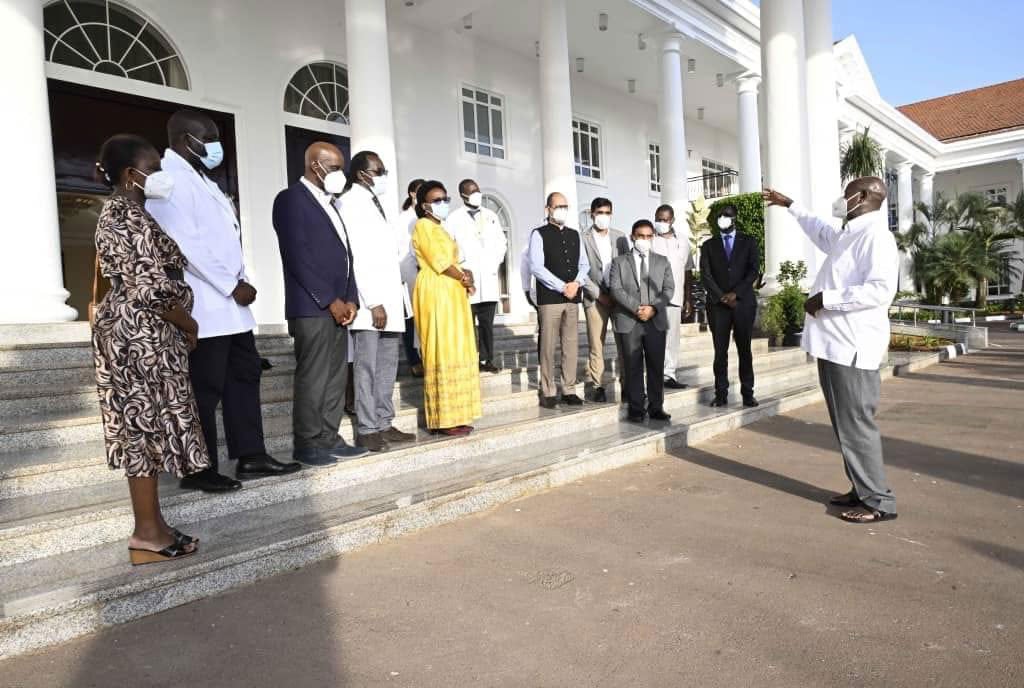Discharged kidney transplant beneficiary, donor in good health – Doctors

Dr Diana Atwine, the Permanent Secretary Ministry of Health (left) chats with Prof Frank Asiimwe during a press conference at the Ministry headquarters in Kampala on March 7, 2024. Photo/Michael Kakumirizi
What you need to know:
- In the law, the only acceptable “reward” is the compensation for living donors for loss of earnings and any other justifiable expenses caused by removal of their organ or related medical examination. Payment is also acceptable for technical services related to organ removal in a regulated setting.
Medical doctors in Mulago Hospital on March 7 said the first patient to benefit from a kidney transplant and his donor, are in good health, more than two months after a successful transplant.
“The transplant patient is doing very well. We are now reviewing him once in two weeks and he is happy,” said Prof Frank Asiimwe, the transplant surgeon who worked on the patient with other medical experts from Uganda and India.
Prof Asiimwe also said the donor is fit and looking for a job now.
“So, if you know a job somewhere, please provide employment. But they are doing very well and they are happy,” he said.
He added that discussions for the second kidney transplant have started but did not share specific timeframes.
The first patient, 24-year-old, was discharged early January after undergoing surgery on December 20, 2023.
Under the new Uganda Human Organ Donation and Transplant law, the unlawful sale of an organ from one's body and paying for an organ have been banned.
Dr Jane Ruth Aceng, the Health Minister said earlier that the ban “will protect Ugandans from being potential victims of organ, cell and tissue trafficking.”
In the law, the only acceptable “reward” is the compensation for living donors for loss of earnings and any other justifiable expenses caused by removal of their organ or related medical examination. Payment is also acceptable for technical services related to organ removal in a regulated setting.
Prof Asiimwe was speaking from the Health Ministry headquarters in Kampala while announcing the forthcoming surgical landscape exhibition slated to take place at the Kololo Ceremonial Grounds on March 26. President Museveni is expected to be the chief guest at the event.
“The landscape for surgery has become wider, and Uganda is catching up with the rest of the world by evolving in surgical interventions. Some people have sought care outside the country and yet so many things can be done within the country," the surgeon said.
He added; "We shall exhibit the kind of services that are available in the country to the nation, policymakers and politicians so that they see how much is being done, and how the existing gaps such as infrastructure, training and funding can be addressed.”
Dr Diana Atwine, the Permanent Secretary Ministry of Health, said there are many success stories of patients who have been operated on in Uganda.
"Right now, they [the transplant team/hospitals] are limited in terms of human resources. We want money to recruit more specialists so that instead of sending people abroad [for medical care] they can be handled here. The specialists are there but they have not been recruited [into public service]. If they are recruited and medical supplies are procured, instead of handling one kidney transplant in a week, they will be able to handle more," she said.
According to information from the Ministry of Health, 13 percent of Ugandans have some kidney disease with 2 percent having end-stage disease –meaning they require kidney transplants. Currently, Ministry of Health data indicated that there are over 1,000 patients with end-stage kidney disease on dialysis.




